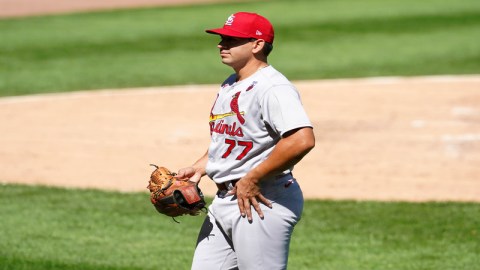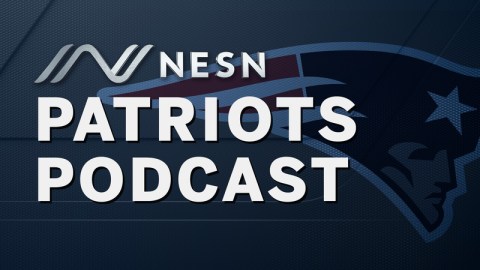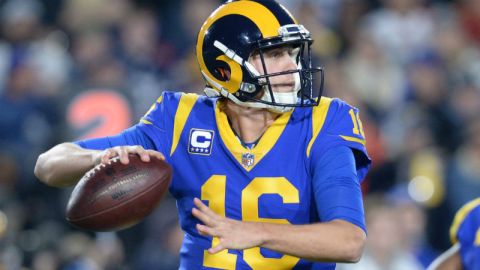FOXBORO, Mass. — Bill Belichick spoke to the media for 25 minutes Wednesday morning, addressing a number of areas during his annual pre-draft news conference. Aside from revealing the interest the Patriots have drawn due to their three second-round draft picks here is a look at some other information the head coach passed along.
Draft Evaluations
Belichick broke down the process his staff takes to put together a draft board, saying they don’t favor overall value against positional need.
"It starts with value," Belichick said. "You value the players, however you put a grade on them. You value them, and then within that, there’s a draft strategy, maybe where you think that player is going to go in the draft, what the league thinks of him relative to what your individual team thinks of him, and need can sometimes factor into that, too, or maybe the compilation of your roster. I shouldn’t necessarily say need — a player that you see having a bigger impact on your team because of whatever the circumstances are on your team versus another one that may — for the same value for lack of a better word — duplicate something that you already have and maybe make it less valuable for your particular team at that particular point in time. When we value the players, we value them kind of on a generic basis: if we were starting a franchise, not who do we have playing here. So we’re not grading players based on what the quality of player we [currently] have is at a position, but in terms of: is this guy a starter in the league, is he an immediate starter in the league, is he a backup, is he a multi-position backup, is he a practice squad player, is he a player that will compete to make the practice squad, whatever it happens to be. Those values then become a little more refined when we actually get into where we are as a team — what the draft value is for that particular day or round, and how the draft is going sometimes."
New Format
With the draft moving to a new, three-day format, there has been plenty of speculation over an increase in trading. In the previous format, the draft’s first three rounds occurred Saturday before the last four rounds got underway Sunday morning, and that resulted in a flurry of overnight trades.
This year, the first round is Thursday night, and the second and third rounds occur Friday before the final four rounds happen Saturday. Belichick was asked if there could be a spike in trades prior to the start of the second round.
"At the end of the first day, we’ll take 32 names off the board, and probably everybody will restack their board based on what is up there," Belichick said. "Certainly, teams that picked in the first round, their needs will change a little bit because they will have just taken a player. When you factor those 32 picks onto the teams that take them, and remove those players from the board, then basically, you’re starting the first round all over again, which is where we were in previous years when that was the third round or the fourth round or whatever it is. Historically, there was more trade movement in the restart round, whatever that round happened to be."
Size Standards
Belichick broke down a pretty interesting dynamic when it comes to team building. First, he was asked if he prefers players at certain positions to have specific measurements, particularly when it comes down to weighing the difference between outside linebacker/defensive end types Sergio Kindle (6-foot-4, 255 pounds) and Brandon Graham (6-foot-1, 263 pounds).
"We have a standard for every position: height, weight and speed, and other measurable that are standard for every position — arm length, things like that, 20-times on linemen, whatever that happens to be on that position," Belichick said. "Some players exceed that standard. Some players fall below it. It doesn’t say players that don’t meet that standard aren’t good players. [Former Detroit Lion] Barry Sanders was short for a running back. I don’t think there’s any complaints about the way Barry Sanders played. But I think when you draft a player like that, you understand that you’re drafting a player that’s shorter than average for his position, or he’s slower than average for his position, or he has longer arms than average for his position, whatever it happens to be. In the end, that’s not the final grade for the player, but it’s something that you recognize when you take a player."
Then, Belichick was asked if the team could make an exception to throw one smaller player into the mix if the rest of the players at that position met those standards. This was probably the most interesting and insightful answer Belichick gave during his session. While it might be advantageous to boast one or two bigger players at a certain position, he said, that can end up throwing the whole scheme out of whack, mostly on defense.
"If you have a 5-7 corner over here you have a 6-4 corner over there, it’s hard to play the same defense," Belichick said. "It really is. Or if you play the same defense, one guy is going to play it one way because of his physical attributes, and another guy is going to play it another way because of his. It’s hard to have balance or symmetry in your scheme when everybody is different."
Tim Tebow
Because no draft discussion is complete without bringing up the lefty from Florida, Belichick took some time to answer a question about Tebow.
"I think he’s got a real good ability," Belichick said. "I don’t think there’s any question about that. He’s the second or third leading passer in SEC history. His resume speaks for itself. He’s an outstanding football player, and he’s an outstanding person. I’ve met and talked to Tim on a number of different occasions. Obviously, we didn’t talk about pro football when he was still in college, but now that he’s eligible for the draft, we talk to him about being a professional quarterback."
College Offenses
Belichick said draft evaluations have been a little cloudier in recent years due to a wide-scaled trend of college programs that use running quarterbacks and spread offenses. He mentioned the Big 12 specifically.
"As college offenses have continued to trend toward running quarterbacks, offenses that have a combination of quarterbacks that run, quarterbacks that throw, varieties of spread offenses and so forth, that’s changed the skill sets of some of the college offensive players and also some of the defensive schemes and types of players that defenses are using to try to combat that type of an offensive system," Belichick said. "It’s not good or bad. It just changes the evaluation process a little bit. You see more of that and a little bit less of some of the traditional offensive and defensive sets. It’s a trend, but there’s certainly more of it this year."
2009 Evaluations
After the playoff loss to Baltimore, Belichick said the offseason process would begin with self-evaluation, which breaks down every aspect of the Patriots’ 2009 season. The head coach was asked how that went.
"The book is closed on the evaluations," Belichick said. "What do we need to do better? That’s a significant list, as it is every year. Are we going to be able to get everything ideally the way we want it? I’m sure we won’t. But at the same time, I do think we will add players and also change our scheme in manners we feel our beneficial to our production as a club."



